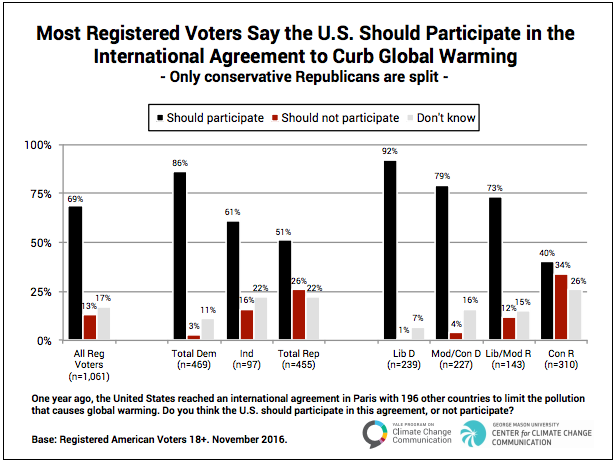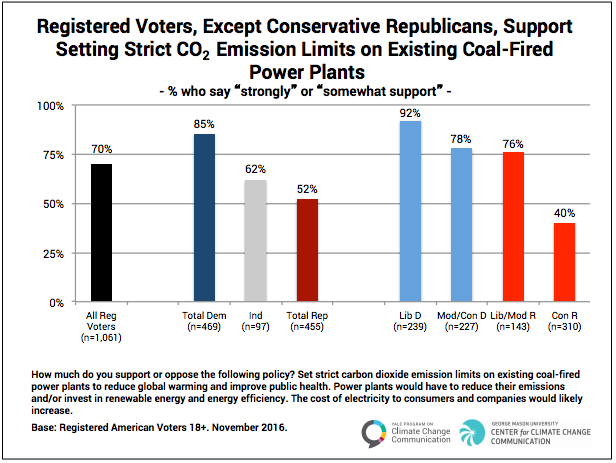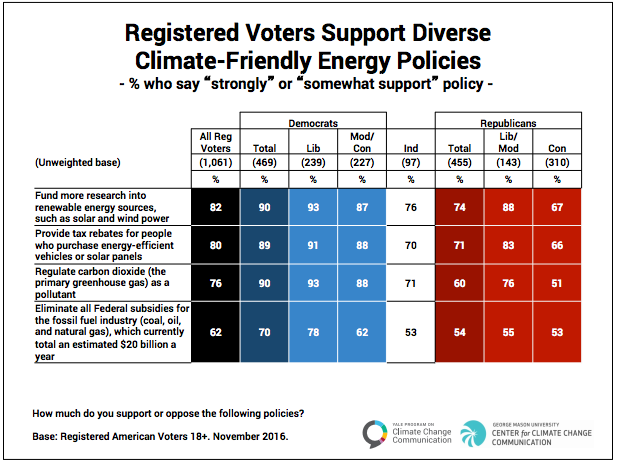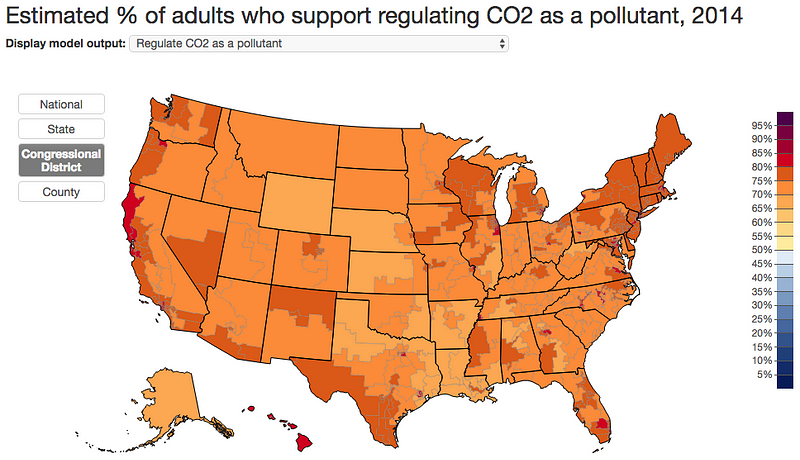Even Republicans Oppose Trump’s Energy Plan
Everyone wants more clean energy.
By Jeremy Deaton
Donald Trump has staked a claim as a populist icon. He has sparred with politicians from his own party, insulted members of the conservative press, and dismissed Republican orthodoxy on issues like Social Security, Medicare and free trade. He is, in his view, a man of the people.
And yet, the so-called “blue-collar billionaire” has laid out a policy agenda that overwhelming favors the wealthy elite. That is abundantly clear on climate and energy, where Trump has promised to genuflect to the fossil fuel lobby.
Trump’s energy plan reflects the preferences of the donor class.
Trump has taken so many sides of so many different issues, it’s hard to say how he forms his policy preferences or whom he regards as his core constituency. If he’s like many politicians, the answer is probably rich people.
A 2014 study from Princeton and Northwestern universities found that, in the United States, “policymaking is dominated by powerful business organizations and a small number of affluent Americans.” While this may feel intuitive — even obvious — this study delivered cold, hard numerical proof. Wealthy Americans have a huge influence over policy. Everyone else, not so much.
Recent research from Washington think tank Demos offers further insight. Political donors — at least the ones we can track — tend to be rich, old, white men. Elite donors tend tend to support fiscal austerity and oppose climate policy, even more so than the typical Republican. Authors note that while “43 percent of Republican adults deny the need for action on climate change, 61 percent of elite Republican donors do.”
This, generally speaking, is how you end up with an energy plan untethered from public opinion, even on issues where liberal Democrats and conservative Republicans broadly agree.
According to a memo from Trump energy adviser Tom Pyle obtained by the Center for Media and Democracy, the incoming administration aims pull out of the Paris Agreement, scrap the Clean Power Plan, and curtail energy subsidies. His energy policies defy not only the interests of the large majority of Americans, but also the preferences.
A new report from Yale and George Mason University shows just how much voters want clean energy.
Democrats and Republicans support the Paris Agreement.
Nearly seven in 10 registered voters believe the United States should take part in the Paris Climate Agreement. This includes more than half of registered Republicans.

Source: Yale/George Mason University
The Paris climate agreement is popular for good reason. U.S. participation in the Paris Agreement keeps pressure on China, Russia and other large polluters to rein in heat-trapping carbon emissions that are fueling all manner of mayhem in the United States — from drought in California to floods in South Florida.
Democrats and Republicans want to curb emissions from coal-fired power plants.
Seven in 10 registered voters want to limit carbon pollution from coal-fired power plants — a core component of the EPA’s Clean Power Plan. This includes more than half of registered Republicans.

Source: Yale/George Mason University
According to the EPA, the Clean Power Plan would save thousands of lives by curbing air pollution and climate change, all while shrinking Americans’ monthly electric bills.
Democrats and Republicans support climate-friendly energy policies.
It’s unclear what the Pyle memo means by “reducing energy subsidies.” That could describe federal support for fossil fuels, clean energy or both. It could refer to tax breaks, funding for research or other measures. While Trump is openly hostile to wind and solar and has promised to eliminate federal spending on renewable energy research, a source close to the president-elect believes that tax credits for wind and solar will “remain in place.” We’ll have to wait to know for sure.
What’s clear is that large majorities of Republicans and Democrats believe the government should fund clean energy research, offer tax rebates for electric cars and solar panels, and eliminate subsidies for coal, oil and natural gas. Most support regulating carbon dioxide as a pollutant, including a majority of conservative Republicans.

A majority of conservative Republicans support each of the policies listed here. Source: Yale/George Mason University
These measures are justifiably popular. Government-backed research is helping to drive down the cost of renewables. Tax credits for wind and solar are spurring the growth of an industry that is creating jobs at an astonishing pace. In 2015, the U.S. solar industry added jobs 12 times faster than the economy as a whole.
Donald Trump is not a populist.
Despite his claims to be a populist, Trump has championed policies that reflect the interests of fossil fuel companies and ignore the desires of his Republican base. Republicans in Congress, meanwhile, are siding with the president-elect.
Matt Yglesias writes in Vox that as long as “Trump is enjoying the lockstep support of congressional Republicans, his opponents need to find ways to turn attention away from the Trump Show and focus it on his basic policy agenda and the ways in which it touches millions of people.”

Support for regulating carbon dioxide as a pollutant by congressional district. Source: Yale/George Mason University
As it happens, millions of Americans want to take on climate change. Men and women of every political stripe and in every congressional district want less carbon pollution and more clean energy — more jobs, better health, smaller electric bills.
Don’t let Donald Trump forget it.
Jeremy Deaton writes for Nexus Media, a syndicated newswire covering climate, energy, policy, art and culture. You can follow him at @deaton_jeremy.



